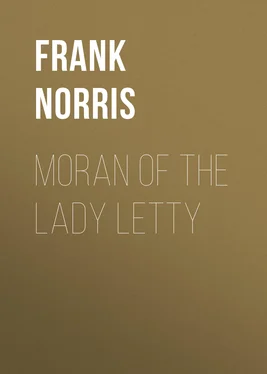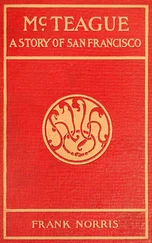Frank Norris - Moran of the Lady Letty
Здесь есть возможность читать онлайн «Frank Norris - Moran of the Lady Letty» — ознакомительный отрывок электронной книги совершенно бесплатно, а после прочтения отрывка купить полную версию. В некоторых случаях можно слушать аудио, скачать через торрент в формате fb2 и присутствует краткое содержание. Жанр: Прочие приключения, Прочие приключения, literature_19, foreign_antique, foreign_prose, на английском языке. Описание произведения, (предисловие) а так же отзывы посетителей доступны на портале библиотеки ЛибКат.
- Название:Moran of the Lady Letty
- Автор:
- Жанр:
- Год:неизвестен
- ISBN:нет данных
- Рейтинг книги:3 / 5. Голосов: 1
-
Избранное:Добавить в избранное
- Отзывы:
-
Ваша оценка:
- 60
- 1
- 2
- 3
- 4
- 5
Moran of the Lady Letty: краткое содержание, описание и аннотация
Предлагаем к чтению аннотацию, описание, краткое содержание или предисловие (зависит от того, что написал сам автор книги «Moran of the Lady Letty»). Если вы не нашли необходимую информацию о книге — напишите в комментариях, мы постараемся отыскать её.
Moran of the Lady Letty — читать онлайн ознакомительный отрывок
Ниже представлен текст книги, разбитый по страницам. Система сохранения места последней прочитанной страницы, позволяет с удобством читать онлайн бесплатно книгу «Moran of the Lady Letty», без необходимости каждый раз заново искать на чём Вы остановились. Поставьте закладку, и сможете в любой момент перейти на страницу, на которой закончили чтение.
Интервал:
Закладка:
It would have been interesting to have followed, step by step, the mental process that now took place in Ross Wilbur’s brain. The Captain had given him two minutes in which to change. The time was short enough, but even at that Wilbur changed more than his clothes during the two minutes he was left to himself in the reekind dark of the schooner’s fo’castle. It was more than a change—it was a revolution. What he made up his mind to do—precisely what mental attitude he decided to adopt, just what new niche he elected wherein to set his feet, it is difficult to say. Only by results could the change be guessed at. He went down the forward hatch at the toe of Kitchell’s boot—silk-hatted, melton-overcoated, patent-booted, and gloved in suedes. Two minutes later there emerged upon the deck a figure in oilskins and a sou’wester. There was blood upon the face of him and the grime of an unclean ship upon his bare hands. It was Wilbur, and yet not Wilbur. In two minutes he had been, in a way, born again. The only traces of his former self were the patent-leather boots, still persistent in their gloss and shine, that showed grim incongruity below the vast compass of the oilskin breeches.
As Wilbur came on deck he saw the crew of the schooner hurrying forward, six of them, Chinamen every one, in brown jeans and black felt hats. On the quarterdeck stood the Captain, barking his orders.
“Consider the Lilee of the Vallee,” bellowed the latter, as his eye fell upon Wilbur the Transformed. “Clap on to that starboard windlass brake, sonny.”
Wilbur saw the Chinamen ranging themselves about what he guessed was the windlass in the schooner’s bow. He followed and took his place among them, grasping one of the bars.
“Break down!” came the next order. Wilbur and the Chinamen obeyed, bearing up and down upon the bars till the slack of the anchor-chain came home and stretched taut and dripping from the hawse-holes.
“‘Vast heavin’!”
And then as Wilbur released the brake and turned about for the next order, he cast his glance out upon the bay, and there, not a hundred and fifty yards away, her spotless sails tense, her cordage humming, her immaculate flanks slipping easily through the waves, the water hissing and churning under her forefoot, clean, gleaming, dainty, and aristocratic, the Ridgeways’ yacht “Petrel” passed like a thing of life. Wilbur saw Nat Ridgeway himself at the wheel. Girls in smart gowns and young fellows in white ducks and yachting caps—all friends of his—crowded the decks. A little orchestra of musicians were reeling off a quickstep.
The popping of a cork and a gale of talk and laughter came to his ears. Wilbur stared at the picture, his face devoid of expression. The “Petrel” came on—drew nearer—was not a hundred feet away from the schooner’s stern. A strong swimmer, such as Wilbur, could cover the distance in a few strides. Two minutes ago Wilbur might have—
“Set your mains’l,” came the bellow of Captain Kitchell. “Clap on to your throat and peak halyards.”
The Chinamen hurried aft.
Wilbur followed.
II. A NAUTICAL EDUCATION
In the course of the next few moments, while the little vessel was being got under way, and while the Ridgeways’ “Petrel” gleamed off into the blue distance, Wilbur made certain observations.
The name of the boat on which he found himself was the “Bertha Millner.” She was a two-topmast, 28-ton keel schooner, 40 feet long, carrying a large spread of sail—mainsail, foresail, jib, flying-jib, two gaff-topsails, and a staysail. She was very dirty and smelt abominably of some kind of rancid oil. Her crew were Chinamen; there was no mate. But the cook—himself a Chinaman—who appeared from time to time at the door of the galley, a potato-masher in his hand, seemed to have some sort of authority over the hands. He acted in a manner as a go-between for the Captain and the crew, sometimes interpreting the former’s orders, and occasionally giving one of his own.
Wilbur heard the Captain address him as Charlie. He spoke pigeon English fairly. Of the balance of the crew—the five Chinamen—Wilbur could make nothing. They never spoke, neither to Captain Kitchell, to Charlie, nor to each other; and for all the notice they took of Wilbur he might easily have been a sack of sand. Wilbur felt that his advent on the “Bertha Millner” was by its very nature an extraordinary event; but the absolute indifference of these brown-suited Mongols, the blankness of their flat, fat faces, the dulness of their slanting, fishlike eyes that never met his own or even wandered in his direction, was uncanny, disquieting. In what strange venture was he now to be involved, toward what unknown vortex was this new current setting, this current that had so suddenly snatched him from the solid ground of his accustomed life?
He told himself grimly that he was to have a free cruise up the bay, perhaps as far as Alviso; perhaps the “Bertha Millner” would even make the circuit of the bay before returning to San Francisco. He might be gone a week. Wilbur could already see the scare-heads of the daily papers the next morning, chronicling the disappearance of “One of Society’s Most Popular Members.”
“That’s well, y’r throat halyards. Here, Lilee of the Vallee, give a couple of pulls on y’r peak halyard purchase.”
Wilbur stared at the Captain helplessly.
“No can tell, hey?” inquired Charlie from the galley. “Pullum disa lope, sabe?”
Wilbur tugged at the rope the cook indicated.
“That’s well, y’r peak halyard purchase,” chanted Captain Kitchell.
Wilbur made the rope fast. The mainsail was set, and hung slatting and flapping in the wind. Next the for’sail was set in much the same manner, and Wilbur was ordered to “lay out on the ji’boom and cast the gaskets off the jib.” He “lay out” as best he could and cast off the gaskets—he knew barely enough of yachting to understand an order here and there—and by the time he was back on the fo’c’sle head the Chinamen were at the jib halyard and hoisting away.
“That’s well, y’r jib halyards.”
The “Bertha Millner” veered round and played off to the wind, tugging at her anchor.
“Man y’r windlass.”
Wilbur and the crew jumped once more to the brakes.
“Brake down, heave y’r anchor to the cathead.”
The anchor-chain, already taut, vibrated and then cranked through the hawse-holes as the hands rose and fell at the brakes. The anchor came home, dripping gray slime. A nor’west wind filled the schooner’s sails, a strong ebb tide caught her underfoot.
“We’re off,” muttered Wilbur, as the “Bertha Millner” heeled to the first gust.
But evidently the schooner was not bound up the bay.
“Must be Vallejo or Benicia, then,” hazarded Wilbur, as the sails grew tenser and the water rippled ever louder under the schooner’s forefoot. “Maybe they’re going after hay or wheat.”
The schooner was tacking, headed directly for Meiggs’s wharf. She came in closer and closer, so close that Wilbur could hear the talk of the fishermen sitting on the stringpieces. He had just made up his mind that they were to make a landing there, when—
“Stand by for stays,” came the raucous bark of the Captain, who had taken on the heel. The sails slatted furiously as the schooner came about. Then the “Bertha Millner” caught the wind again and lay over quietly and contentedly to her work. The next tack brought the schooner close under Alcatraz. The sea became heavier, the breeze grew stiff and smelled of the outside ocean. Out beyond them to westward opened the Golden Gate, a bleak vista of gray-green water roughened with white-caps.
“Stand by for stays.”
Once again as the rudder went hard over, the “Bertha Millner” fretted and danced and shook her sails, calling impatiently for the wind, chafing at its absence like a child reft of a toy. Then again she scooped the nor’wester in the hollow palms of her tense canvases and settled quietly down on the new tack, her bowsprit pointing straight toward the Presidio.
Читать дальшеИнтервал:
Закладка:
Похожие книги на «Moran of the Lady Letty»
Представляем Вашему вниманию похожие книги на «Moran of the Lady Letty» списком для выбора. Мы отобрали схожую по названию и смыслу литературу в надежде предоставить читателям больше вариантов отыскать новые, интересные, ещё непрочитанные произведения.
Обсуждение, отзывы о книге «Moran of the Lady Letty» и просто собственные мнения читателей. Оставьте ваши комментарии, напишите, что Вы думаете о произведении, его смысле или главных героях. Укажите что конкретно понравилось, а что нет, и почему Вы так считаете.












